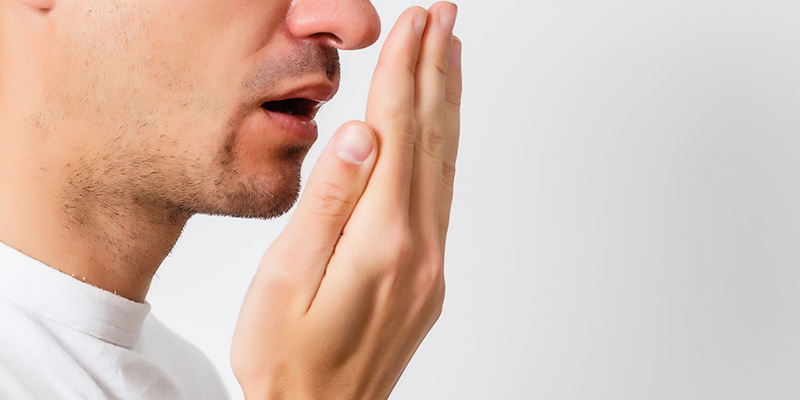
On a flight to Germany, a middle-aged man sat next to me. I smelled that uncomfortable smell right from the very moment he began descending on his seat. As a dentist, I felt bad about it. What a difficult situation. A very well-dressed gentleman and clear to be a businessman. But you can't approach him because of the bad breath. How would you tell him? You can't, can you? It got me thinking about his colleagues, friends, and family.
Bad breath is one of the most sensitive topics around, which is also one of the hardest to mention to another person and can cause for the person in question to feel quite poorly. When your spouse mentions it, it can perhaps lead to an argument or resentment. When your colleague mentions it, it can lead to you feeling awful. When your child mentions it, it can lead you to try and find a way to resolve it. If your friends or best friends mention it, it is the type of problem which may cause you to grow apart from people, and sometimes it is such a private matter that people can refrain from saying it to your face.
The issue of bad breath dates back to ancient times. Since time immemorial, people with bad breath sought to get rid of this nasty smell. Sometimes they chewed on plant stalks or leaves. Sometimes people believed the mouth of sinners smelled. Even Hippocrates told young women to gargle with wine and chew aniseed and seed in order for their mouths to smell nice.
What is bad breath? Is it normal? Or is it a disease? Is there a cure?
Let's look at the answers to these questions together. Because a person who thinks they have bad breath begin growing apart from other people and avoid close contact with them. This situation isn't really bearable for people who are in the same social circle with the person who has bad breath. Murat Aydın, M.D describes this situation in the most meaningful way, saying, "If more than one person can notice bad odor in the mouth of the same person at any hour of the day and this situation lingers on continuously or discontinuously for at least a couple of months, this clinical picture is called bad breath even if they don't notice this smell themselves.".
The World Health Organization describes health as "Health is a state of complete physical, mental and social well-being and not merely the absence of disease or infirmity.". From this point of view, we can call bad breath a disease, since it suits this definition of health, which includes the individual's physical, mental, and social well-being. It is possible to encounter various classifications in literature. Dr. Murat Aydın classifies bad breath as Type 0, 1 ,2 ,3 ,4, and 5.
Type 0: Physiological bad breath. It is used for defining the smell which is felt after waking up in the morning and goes away on its own in a couple of hours. It exists more or less in every living being. It does not require cure.
Type 1: Tongue smell. Patients with a bad odor in their tongue belong in this group. It is the unpleasantly smelling gas which is caused by the bacteria that settle between the plumy bulges on the back of the tongue and sulfurous amino acids.
Type 2: Bad breath of throat-sinus origin. This type originates from the back of the mouth due to a lasting infection on the nose, sinuses, and throat.
Type 3: Bad breath of digestive tract. It is the type of odor originating from the stomach. When the digestive organs or enzymes are not able to properly digest food, the duty falls upon the bacteria and decay begins. The gas which is a by-product from this process are involuntary and felt by the patient as bad breath in the mouth.
Type 4: The odor which originates from the lungs and is also called "breath smell". It can occur in two ways. First is feeling of the bad breath caused by an infection in the lungs. Second is the smell which is encountered in diabetics, gout and dialysis patients, pregnant women and patients coming out of anesthesia.
Type 5: Bad breath of psychogenic origin. Patients that belong to this group do not actually have bad breath in their mouth, however they are obsessive about the fact that they have bad breath.
So, how should the treatment be?
- It is imperative to visit your dentist. Because cavities in the teeth, inflammation of the gums, a filling going bad, broken harmony of crowns and bridges are needed to be treated and brought back to health with dentistry. Oral hygiene needs to be maintained carefully and the tongue also need to be brushed alongside our teeth.
- Avoid using mouth wash that includes alcohol (an example for alcohol-free, antiseptic mouthwash which also includes zinc can be given Pharmol ZN).
- Tooth paste which includes zinc should be preferred. (The toothpastes which include zinc in alphabetical order are Colgate Sensitive, Ipana Expert 7, Ipana Pro Expert, Signal Integral and Signal Nutriactive.)
- Chewing gum that includes zinc (Carbonated Vivident is an example of this.) should be used.
- It is important to remember that alcoholic beverages also cause bad breath.
- Yogurt that includes probiotics should be consumed.
These approaches help remove Type 1 and most Type 2 bad breath. If the patients have other types of bad breath, specialists need to be contacted for the treatment of causes which lead to bad breath.
May you have healthy teeth, happy and peaceful smiles.
Zerrin Işık Tüfekçi
August 2013 Ankara Life Magazine

 Türkçe
Türkçe English
English Français
Français русский
русский Español
Español